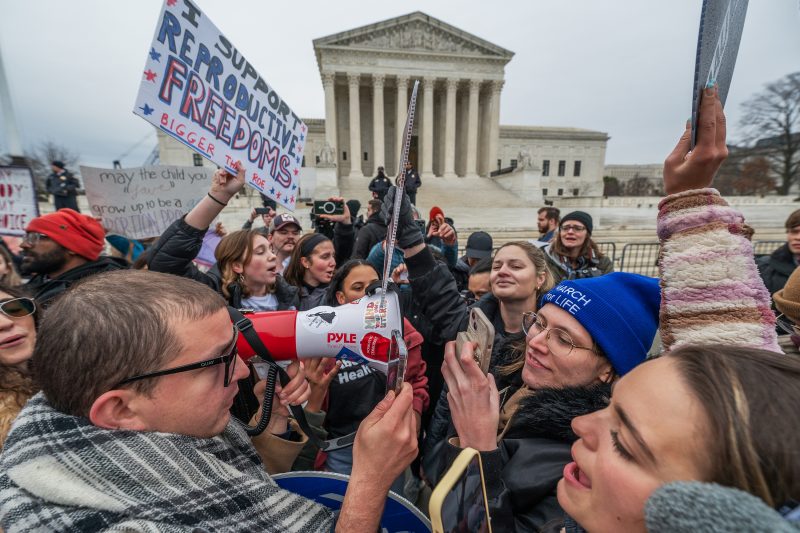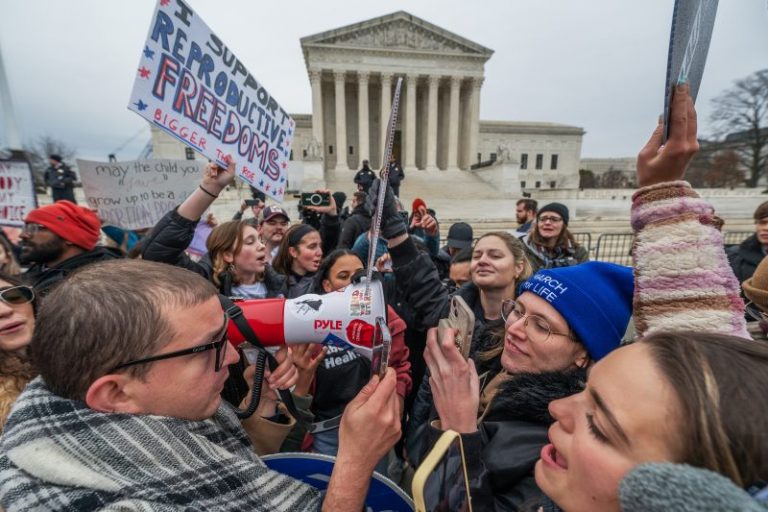
One year after the Supreme Court ended the constitutional right to abortion, the issue reverberates almost as strongly as it did in the days immediately following the decision. Personal repercussions continue to affect millions of people. Politically, the landscape has been altered significantly, with little reversal in sight.
Abortion was legal for half a century after the 1973 decision in Roe v. Wade, and for those many years, opponents of abortion rights fought to reverse the ruling. Last year’s decision in Dobbs v. Jackson Women’s Health Organization put the issue back into the political arena, with a flurry of legislation in the states.
For much of the previous 50 years, the passion and political energy rested more with abortion opponents than with those who favored abortion rights. With Dobbs, that changed overnight. Election results since have shown how much the decision has been a motivator for the political left. And a conservative movement once united behind a single goal — overturning Roe — is now split about both policy goals and political strategy.
The first sign of the power of the reaction to the Dobbs decision came weeks after the ruling. Voters last August in Kansas, by overwhelming numbers, said they wanted protection for abortion rights to stay in the state’s constitution. Amid a major mobilizing effort, Democrats, independents and many Republicans joined to protect abortion rights.
In November’s midterm elections, evidence of an altered political landscape was demonstrated again, perhaps most strongly in Michigan. Voters there adopted an amendment to add abortion rights to the state constitution. The result was powered strongly by voters under age 45, who voted 2-1 in favor of abortion rights.
Exit polls showed that a remarkable 45 percent of voters in Michigan said abortion was the single most important issue in their decisions. That electorate put Democrats in control of the state legislature for the first time in 40 years and gave Gov. Gretchen Whitmer (D), who had made protecting abortion rights a signature issue, an easy reelection victory.
In April of this year, voters in Wisconsin overwhelmingly elected a liberal justice to the state supreme court in an election that was fought significantly on the abortion issue. The Dobbs decision had triggered a pre-Civil War law banning abortion, and the election of Milwaukee County Judge Janet Protasiewicz shifted the balance on the state’s highest court from conservative to liberal, with the expectation that the new court would eliminate the old law. College students turned out in record numbers in behalf of the winning candidate.
A year after Dobbs, has the issue lost its potency? Not according to the most recent polling by the Gallup organization. Gallup finds that only 14 percent of registered voters say abortion is not a major issue, a record low, 2 percentage points lower than a year ago and 9 percentage points lower than the previous record low of 23 percent in 2007.
Not only does the issue remain potent, it also has more strength among those who favor abortion rights than among those who oppose them. Gallup’s new polling shows that 33 percent of registered voters who favor abortion rights, as compared with 23 percent of voters who oppose those rights, say they will only vote for candidates in major races who share their views on the issue. This marks a change in the balance between the two sides of the debate. For the two decades before the Dobbs decision, those who were abortion-centric in their voting behavior were more on the side of opposition to abortion rights.
Gallup’s Lydia Saad made another observation in her analysis of the findings: “A higher percentage of Democrats are pro-choice voters (37 percent) than Republicans are pro-life voters (21 percent), indicating that Democratic candidates are poised to benefit disproportionately from pro-choice intensity at the ballot box in the wake of Dobbs.”
She also noted that the segment of the electorate that opposes abortion rights is less energized on the issue than has been the case in the past, a factor that has affected some tests in state elections and could do so similarly in the future.
President Biden and Vice President Harris have done everything they can since the Dobbs decision to keep the issue at the forefront of political debate. They and their Democratic allies marked the first anniversary this weekend with statements, tweets and other messages designed to aid in that effort. Biden and his team know how much they will need a motivated electorate in 2024 to prevail in his bid for reelection.
Polling reported in May by the health-care organization KFF found that 3 in 10 voters say they will only vote for a candidate in 2024 who shares their views on abortion, including 46 percent of Democrats. More than half of all voters overall say abortion is “just one of many important factors” in their vote decision, and 16 percent say abortion isn’t an important part of their choice. KFF also found that Democrats have a significant advantage over Republicans (42 percent to 26 percent) on which party best represents people’s views on abortion.
As the votes in Michigan and Wisconsin showed, younger voters are a key part of the political equation on the abortion issue. In Gallup polling, 48 percent of those ages 18-29 say abortion should be legal in all circumstances, while 11 percent say it should be illegal in all circumstances, with the remainder saying it should be legal only under certain circumstances. As recently as 2017, 25 percent of those in this age bracket said abortion should be illegal under all circumstances.
Since 2010, the number of those ages 18-29 who call themselves “pro-choice” has risen from 39 percent to 64 percent, though it peaked at 71 percent a year ago. Among those in older age categories, the percentage who call themselves pro-choice varies from 40 percent to 56 percent.
Republican state legislatures have not been consistent in their legislative bans on abortion, and Republican presidential candidates are split on where to draw the line. Florida Gov. Ron DeSantis signed legislation this spring to ban abortion after six weeks. Former president Donald Trump, who regularly claims credit for nominating three Supreme Court justices who helped bring about the overturning of Roe, has indicated that he thinks the Florida law is too stringent, but he has fudged what he thinks is an appropriate alternative.
Former vice president Mike Pence is making abortion a central plank in his presidential bid. “The cause of life is the calling of our lifetime,” he said Friday at the Faith and Freedom Coalition’s “Road to Majority” conference in Washington. Pence said he favored a national law that would ban abortion after 15 weeks into a pregnancy as a “minimum national standard.” He also said that Republicans should not relent until every state has restricted the right to abortion and that national law is in place.
After speaking at the same conference, former New Jersey governor Chris Christie told CNN he thinks the states, rather than Congress, should take the lead on legislation, noting that there is not a consensus for the kind of national law advocated by Pence. “Let’s let the states make these judgments,” he said. “The governors, the legislatures, and the people of these states should have a right to weigh in.”
Former South Carolina governor Nikki Haley, meanwhile, has urged Republicans to find more inclusive ways of talking about the issue while maintaining their overall position opposing abortion rights at later stages of pregnancy.
The debate within the Republican Party about how to handle the issue speaks volumes about the shift in abortion politics, and the fact that Biden continues to highlight it underscores the same. Between now and November 2024, abortion will remain at the center of political debate, with the advantage for now with the Democrats.


Comments are closed.